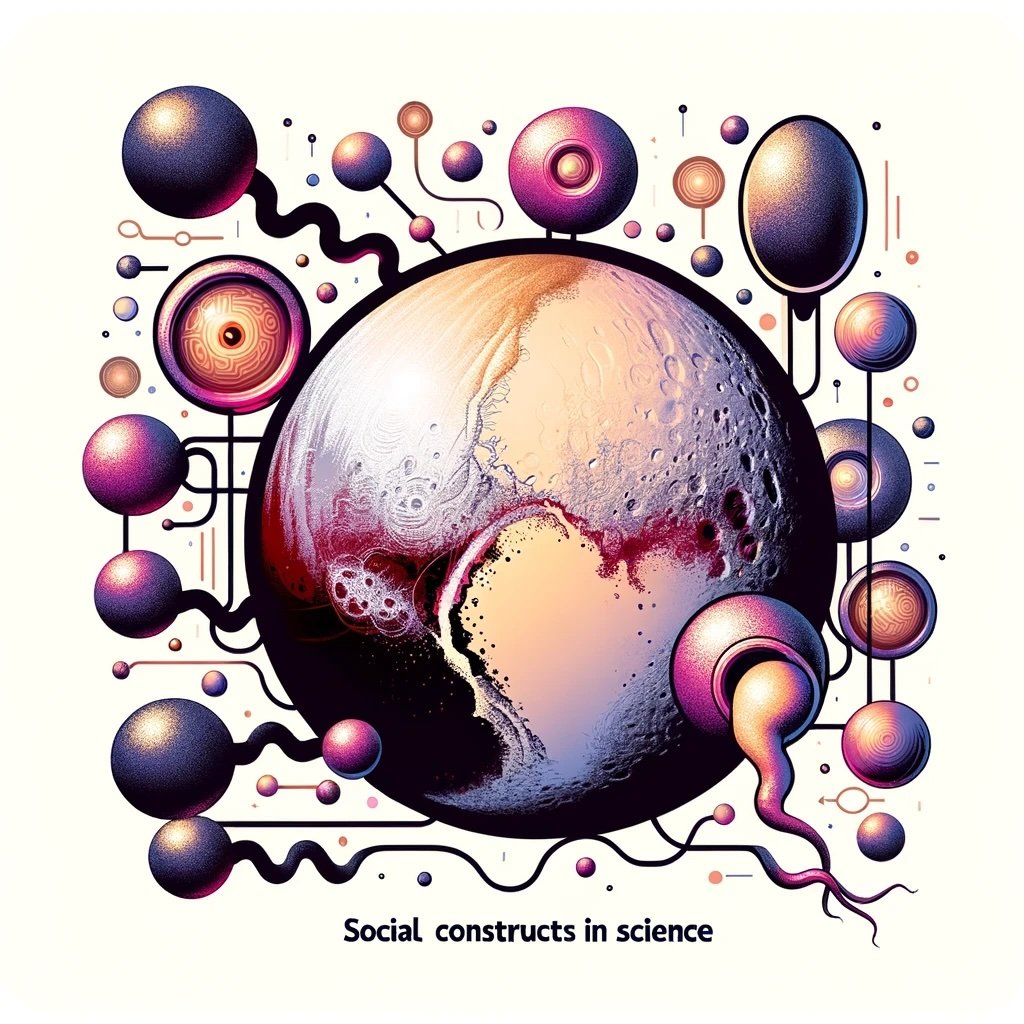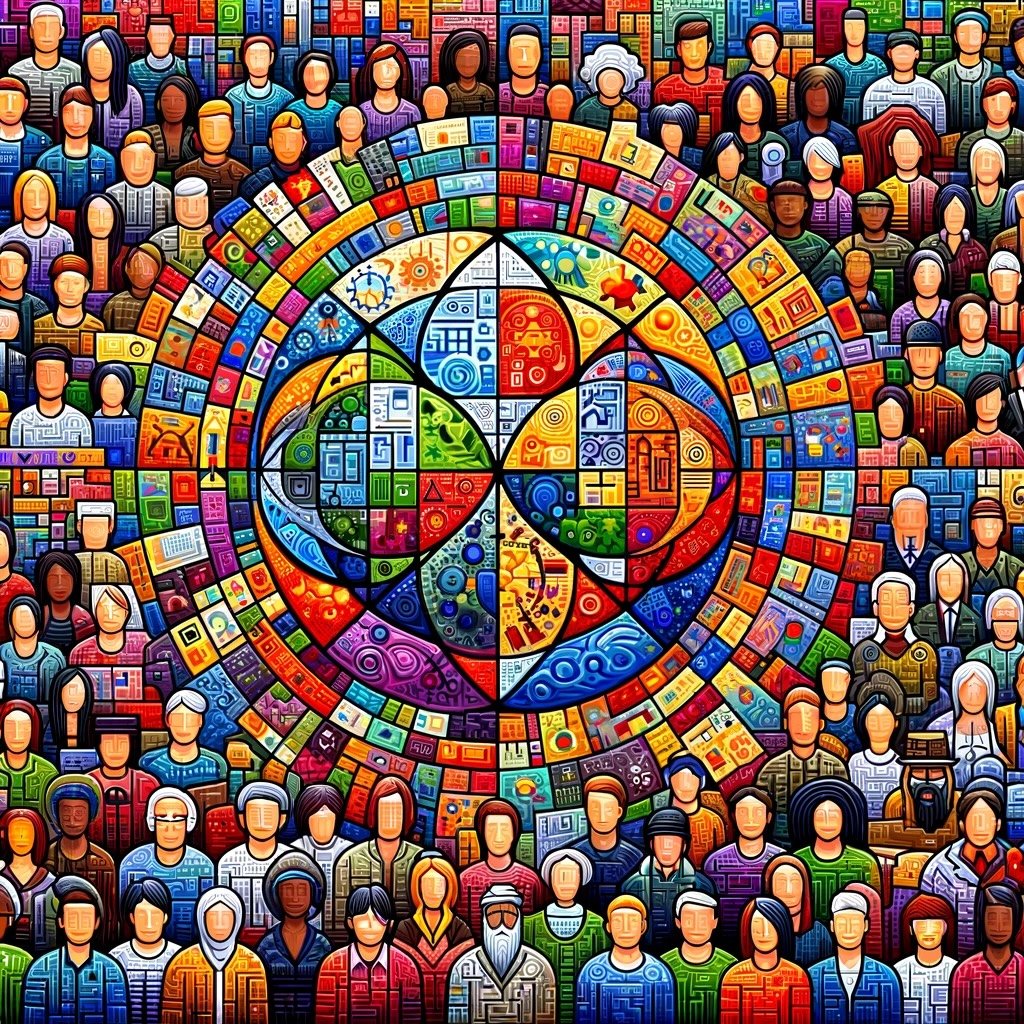Welcome to my blog!
Every morning, I begin with a cup of coffee and 15 minutes of free thinking. I write down everything that comes to mind, from new ideas to thoughts that emerged overnight. This is where I develop and refine my new research. You'll find some repetition and ideas still in progress. Some might seem unusual or unclear at first, but that's part of the journey! I'm excited to share how my ideas form and evolve.
The Practicality of Logic: From Symbols to Everyday Use
This post examines the transition from the symbolic complexities of logic to its practical applications in daily life, questioning how deeply the principles of logical theory influence our everyday reasoning.
If you look at logic, it’s full of symbols. How does that material relate to everyday reasoning?
I think of logic as being the guardian of coherence. To guard coherence is to focus on patterns of reasoning, on how beliefs or opinions interact together, on how theories hold with the various assumptions they make and how they make predictions or prove theorems. Coherence is a vague term, and it can be measured with different standards. In mathematics, coherence means consistency, the avoidance of contradiction. The adopted standards for mathematical reasoning are those of validity. Validity is very strict, if not austere. In the court of law, we adopt less demanding standards, encapsulated by the idea of “reasonable doubt.” We wouldn’t be able to prosecute anyone if we adopted the standards of validity, and everyone would end up in jail if our logical standards made us gullible. In some scientific contexts, we work with explanation, based on partial evidence from the past or traces of events, and we try to work out what happens from this limited information. In other branches, we try to make predictions under uncertainty, so we adopt standards that align with probabilistic reasoning.
This brings us to the heart of the matter: logic and its symbols. In the twentieth century, as mathematics grew increasingly complex and weird, mathematicians revamped logic research to provide a solid foundation, leading to the development of formal languages and symbolic logical theories. So philosophers and mathematicians began asking how we could fortify the standards of mathematical reasoning, and how we could make sure that it never leads to contradiction, no matter how intricate it got. Developing formal languages became a necessity for this endeavour. The result was the development of symbolic logical theories that have been refined and simplified, and that we can now teach at a relatively basic level to students. We get from the symbolism the kind of clarity of what ideal reasoning might look like.
How does that then relate to everyday reasoning? I’m not too sure. I have a friend who learned quite advanced mathematics when they went to university to study engineering, and they are now working on research and development of airplane engines, and they apply very little of the maths they learned at university. I doubt they could still perform the maths they had to learn for their core examination in their first year. The same thing with other people I know who have learned a great amount of mathematical economics and are now working in investments; they don’t get to apply the mathematics that they learned directly and probably forgot most of it. Similarly, learning the symbolism of logic subtly trains the mind, providing tools that, while not always directly applied, enhance our cognitive processes and decision-making in everyday life.
What I think is lacking, however, is a more mundane discussion of logical reasoning in society. Analytic philosophers write papers with the rigidity of validity for their logical standards, but I don’t know that many others explicitly try to seek logical guidance. Regrettably, logicians have not yet succeeded in making discussions of everyday logical reasoning accessible and beneficial to a broader audience. I’m trying to bridge that gap.
Why Logic? Beyond Individual Insight to Societal Unity
This post explores how learning logic not only sharpens individual reasoning and debate skills but more importantly serves as a foundational tool for fostering societal cohesion and constructive dialogue.
What is one big benefit that people could get from people learning logic?
A straightforward response might highlight personal benefits such as enhanced clarity in reasoning, coherence in beliefs, and improved communication efficacy. Envision communication as a strategic game where participants aim to persuade each other of their viewpoints; logic equips you with the strategies to avoid errors in thought organization and expression. While logic itself doesn’t directly bestow truth, it ensures the preservation of truth—assuming you commence with true beliefs, logical progression maintains that integrity. Logic empowers you to dissect and simplify complex views into their foundational truths. You can thus reason from your goals, starting with the view that you want to defend, and break it down into simpler components from which it follows and that are easier to support logically. With logic, you can build chains of reasoning that go from truths you know to truths you learn. In essence, logic is indispensable for truth-seekers: identifying a logical mistake negates the necessity to contest the proposition’s truth, as flawed reasoning destroys the argument itself, irrespective of content. These virtues of logic are particularly pronounced in debate contexts, where success is gauged by persuading the audience of your standpoint over that of your adversary, and extend to the political arena in policy communication and electoral strategies. This perspective underscores logic's individualistic benefits.
In Logic in the Wild, however, I articulate a richer response to the question, not targeted at benefits to individuals, but at benefits to society. The slogan I use is that logic provides a “neutral space of dialectical enquiry”-a space in which participants collaborate to explore the coherence in the various views on the same topic, and seek a common ground, seeking a stance that is neutral and aligns with all parties in the exchange of ideas. This approach transcends the contentious battle over the truth of beliefs, championing instead a constructive scrutiny of mutual interests and shared resolutions. Engaging neutrally in this dialectical space requires participants to eschew dogmatic defense of personal views in favor of a collaborative quest for logical common ground and collective understanding. This, in my view, represents logic’s most profound contribution: not in amplifying individual agendas but in bridging divides towards unified solutions. In a world infested by social media that polarises populations into extreme and untenable views, reinforced by “like buttons” that transform debates into voting procedures over opinions, logic is the beacon of hope that can redress constructive dialogue in society.
Why Logic? For Personal Growth and Community Rapprochement
Exploring the role of logic in enhancing personal understanding and improving community interactions, facilitating a bridge between differing perspectives.
What benefits could people gain from learning logic?
At the heart of logic is the capacity to navigate the "why?"—a question that can either challenge or enlighten. When someone asks you, "Why do you believe that?", how do you interpret their intention? Do you see it as a challenge to your beliefs, or as a genuine curiosity about your thought process? Without an appreciation for logic, you might feel judged, missing an opportunity for a deeper connection and understanding.
The inability to engage with others logically not only stifles our capacity to appreciate the coherence in differing viewpoints but also traps us in a cycle of unnecessary conflict and miscommunication. Instead of reflexively opposing views that differ from our own, asking "Why?" opens a door to understanding. It reveals the possibility that the beliefs of others, though initially seeming misguided, may be rooted in thought processes not unlike our own. By embracing logical interaction, we allow ourselves to explore alternative perspectives without feeling threatened, providing space for others to share their insights and enrich our worldview. So instead of expressing your opinion in the opposite of what they claim, and getting into a pointless argument, ask “why?” and see where that leads.
Learning logical thinking gives the ability to discern the coherence in someone else's viewpoint without necessitating emotional alignment. If sympathy can be a bit patronising, and empathy too demanding, logic provides a middle ground to explore differences without challenging who you are, and also who the others are.
Beyond the individual, how do communities stand to gain from enhanced logical interactions? By fostering more constructive communication, logic paves the way for shared solutions to societal challenges. In today's world, where truth can be as divisive as it is enlightening, the adversarial nature of social media further exacerbates division. Platforms that encourage binary responses to complex issues, reducing discourse to a series of likes or shares, diminish the richness of diverse opinions. This not only stifles nuanced discussion but also undermines the democratic process by polarizing society into increasingly rigid and opposing camps.
By embracing logical reasoning, we challenge the notion that to disagree is to disapprove. We learn that sharing or liking an opinion does not render it "truer", nor does disagreement necessarily imply rejection. Logic empowers us to transcend the limitations of binary thinking, encouraging a society that values dialogue over division, understanding over antagonism, and community over isolation.
In learning and applying logic, we find not just a tool for argumentation but a foundation for building more inclusive, thoughtful, and resilient communities. It's through the clarity of reason that we can begin to untangle the complex web of human beliefs and values, finding common ground even amidst our deepest differences.
Conceptual Erasure and Logical Silencing: Voices in the Void
This post explores the deep-seated issues of epistemic injustice faced by queer and trans individuals, highlighting the pivotal role of language and community in affirming identity and the dire consequences of its absence.
In Judith Butler's recent work, "Who’s Afraid of Gender (2024)," a compelling passage (p.106) captures the essence of a struggle faced by many within the queer and trans community. Butler articulates the bleak reality for individuals whose lives and identities are marginalized due to the lack of language and community acceptance:
“If a queer or trans kid seeks to live, if a girl assigned male at birth seeks to change the gender expectations made of her, if a boy assigned female at birth is seeking to affirm his life, and there is no language or community in which these lives can be affirmed, they become the waste expelled from the human community, and their sexuality and their gender become the unspeakable. Heteronormativity becomes mandatory, backed by law or doctrine, forming the horizon of the thinkable, the limits of the imaginable—and the livable."
This concept resonates deeply with the notion of hermeneutical injustice, a term Miranda Fricker coins in "Epistemic Injustice (2007)," to describe a situation where a lack of terminology prevents individuals from understanding and communicating their experiences, making it next to impossible to make sense of their lived experiences. Fricker's example of women who, upon sharing experiences of sexual harassment, found themselves without the language to articulate their plight, mirrors the experiences Butler describes. Before these women could name their harassment, they were ostracized, deemed overly sensitive for not "lightening up" or being able to take a joke.
What Butler describes about the experiences of queer and trans kids works with the same idea, namely that not having terminology available to the community to express one’s lived experiences erases them. Unlike the case Fricker describes where the terminology had to be created to make sense of the harassment experienced by women, the terminology for queer and trans kids is available, even if only recently created. What Butler criticises with modern society, however, is the resistance to adopt the terminology and accept the way people make sense of their life. Even more damaging, it’s the call to eradicate the terminology altogether, with governments now censoring books on critical theory. This is not only erasing identities, but actively silencing them.
Now, this leads me to consider that we are facing yet another form of epistemic injustice, closely related to hermeneutical injustice, which I propose to call “conceptual injustice.” Conceptual injustice occurs when someone is wronged by being denied the vocabulary necessary to express their lived experiences. Beyond this, I suggest an even deeper layer of epistemic injustice that cuts further than the mere availability of concepts. This I term 'logical injustice' (Mangraviti 2023), which operates at the level of coherence within one’s experiences. The absence of appropriate concepts not only renders the sexuality and gender of trans and queer individuals unspeakable but also "un-reasonable." It’s not merely that their experiences cannot be expressed; they cannot be reasoned with, and thus, cannot be coherently integrated into their sense of self.
The stakes of this discussion are high. Without the ability to express and reason through one's experiences, individuals are not just silenced; they are systematically excluded from the discourse that shapes human understanding and community. This form of injustice doesn't just deny queer and trans individuals their voice; it denies them their very place in the world. It becomes clear that the fight for epistemic justice is not just about finding the right words. It's about affirming the coherence of the experiences of those marginalized by societal norms, ensuring that every individual has the language and the logical space to make their lives coherent and heard.
References:
Butler, Judith. Who’s Afraid of Gender? London: Penguin Random House UK, 2024.
Fricker, Miranda. Epistemic Injustice. Oxford University Press, 2007.
Mangraviti, Franci. “The Contribution of Logic to Epistemic Injustice.” Social Epistemology, December 13, 2023, 1–13.
The Complexity of Racism Accusations: A Reflective Analysis
This post discusses the nuanced question of whether accusations of racism can themselves be racially motivated, especially in light of recent criticisms by NZ political leaders against designated spaces for Māori and Pacifica students.
Is it possible to be racist by accusing someone else of being racist? As I’ve said in yesterday’s post, one needs to avoid the tu quoque fallacy (the “you too” fallacy). This logical pitfall involves dismissing someone’s critique by pointing out their own shortcomings in the same area. Imagine someone telling you to consider reducing your sugar consumption due to heart health concerns, only to retort with a mention of the accuser's past heart issues. This response, though perhaps momentarily satisfying, is a classic example of the tu quoque fallacy, as their health does not negate the potential risks to yours.
Applying this logic to racism, consider the scenario where one's prejudiced remark is met with an accusation of racism, only to counter by highlighting the accuser's past insensitive joke. Both instances can indeed be racist; the issue at hand is whether such accusations can be inherently racist.
My contemplation is stirred by the allegations from New Zealand's political figures, Winston Peters and David Seymour, against the provision of spaces designated for Māori and Pacifica individuals at The University of Auckland. They equate this to segregation, with Peters taking a further demagogical step into contentious territory by comparing it to the KKK. This comparison is not only inflammatory but reveals a deeper misunderstanding of the intention behind these spaces.
These spaces are not borne out of a desire to segregate but from a commitment to foster community and belonging among students who experience marginalization within the educational system. This approach extends beyond Māori and Pacifica students; universities globally allocate spaces for various groups to enrich the learning experience and foster inclusivity. Even if we agree that excluding people other than Māori and Pacifica can be explained in terms of the folk notions of race (I don’t believe this is true, but I’m making a logical point), I claim that reducing the action to one that is motivated by race is racist. Indeed, while the Māori and Pacifica designated spaces may overlap with these folk notions of race, it's erroneous to conclude that their establishment is rooted in racial exclusion. Rather, they are motivated by the goal of creating a supportive environment that acknowledges and addresses the unique challenges these groups face.
To insinuate that these efforts are akin to segregation or racism is, in itself, a racist act. It overlooks the genuine aim of creating a supportive environment for students to thrive academically and socially. The critical distinction lies in the motivation behind these actions—one aims to uplift and support, while the other seeks to divide and exclude.
The accusation of racism by Peters and Seymour, therefore, is not just misguided; it is a reflection of racism itself. It is troubling that such perspectives gain traction in public discourse, highlighting the need for a deeper understanding of racism, its implications, and the importance of genuinely inclusive educational practices.
This dialogue is not an instance of the tu quoque fallacy but a necessary confrontation of racism in all its forms. The goal is to cultivate an academic environment where all students, irrespective of their background, feel valued and supported—a mission that transcends mere accusations and seeks to address the root causes of discrimination and exclusion.
Beyond Division: Understanding the Role of Community Spaces at University
This blog addresses the contentious debate surrounding designated spaces for Māori and Pacifica students at The University of Auckland, refuting accusations of racism with a nuanced discussion on community, identity, and the tu quoque fallacy.
In a prior discussion, I explored the troubling comparison drawn by Winston Peters between affirmative policies and the reprehensible ideologies of Nazi Germany. This debate has unfortunately escalated. The University of Auckland's initiative to create spaces specifically for Māori and Pacifica students aims to foster a sense of belonging and community. These areas are vital for enabling students from these backgrounds to feel integrated within the academic environment, encouraging their success and future contributions to society.
Designated spaces for various groups, such as LGBTQ+, religious communities, women, and numerous student clubs, are commonplace within universities. They serve as essential gathering points for like-minded individuals or those with shared identities, promoting a supportive community atmosphere. Despite this, the Act party and NZ First, spearheaded by David Seymour and Winston Peters, have criticized these spaces for Māori and Pacifica students as racist. Utilizing social media platforms, they have equated these inclusive efforts with segregation and apartheid, invoking extreme comparisons to the KKK.
My argument against these claims centers on the misunderstanding and misrepresentation of what these spaces represent. They are not about exclusion but about fostering positive, community-building initiatives. Despite attempting to clarify this on social media, I've encountered significant hostility, which has only reinforced my resolve to address these issues away from the fraught environment of online debate.
Addressing the criticisms from Seymour and Peters brings us to the concept of the tu quoque fallacy, often encapsulated as "you too." This fallacy arises when someone dismisses an argument by pointing out a similar failing in the person making the argument. For instance, if confronted about a drinking problem that adversely affects my family and work, and I retort that you also suffer from a more significant drinking issue, I'm diverting from the original concern by accusing you of the same. This does not address the argument's substance; rather, it sidesteps it by shifting focus. Such a tactic, however, doesn’t apply here. The criticisms concerning the university’s policies on designated spaces misrepresent their purpose and impact. These spaces are not about segregating or excluding based on race; they are about fostering a supportive community for Māori and Pacifica students. The intention is not to limit access to communal areas for other students but to enhance the sense of belonging and community support for all. By arguing that these spaces constitute racism, critics like Seymour and Peters are not engaging with the actual objectives of these initiatives but are instead projecting a misunderstanding that overlooks the essence of community building.
To assert that these spaces are based on racial exclusion overlooks the university's intent and the nuanced realities of Māori and Pacifica communities. Such claims not only misunderstand the purpose behind these spaces but also, unfortunately, veer into racism by reducing these richly diverse communities to simplistic racial categories. Māori and Pacifica identities are founded on deep historical, cultural, and traditional connections, far beyond the narrow confines of race.
To focus exclusively on these community spaces as a form of segregation, while ignoring the wide array of similar spaces for other student groups, is to misinterpret their purpose and, more insidiously, to target Māori and Pacifica students based on a reductive understanding of race. This approach denies the complexity of their identities and undermines the very notion of inclusive community building.
By challenging the narrative that these designated spaces constitute racism, we confront a broader dialogue about community, identity, and the role of universities in supporting a diverse student body. It is not the act of creating spaces for Māori and Pacifica students that is racist, but rather the distortion of these initiatives' intentions and the denial of their positive impact on student wellbeing and inclusivity.
The Struggle of Intersectional Logic: Top-Down vs. Bottom-Up Approaches
This post explores the challenges and potential solutions in addressing intersectional oppression through the lens of top-down and bottom-up logical approaches, inspired by the limitations of ceteris paribus logic in social contexts.
In a previous blog, I highlighted the pitfalls of employing ceteris paribus logic within social contexts. This type of logic, though prevalent in scientific inquiry for isolating variables, falters in social analysis by its very nature of holding factors constant, inadvertently obscuring the multifaceted oppression experienced by marginalized groups.
The dilemma emerges starkly when we consider isolated variables separately—gender and race, for instance. At first glance, in a given context, it may appear that women, as a broad category, do not face oppression in comparison to men, and similarly, people of colour might not seem oppressed when compared to their white counterparts. However, this perspective fails to illuminate the unique struggles of women of colour, who endure oppression at the intersection of both race and gender—a reality that remains hidden under the ceteris paribus approach.
This brings us to an important realization: in the realm of social sciences, there are no universal generalizations. Nancy Cartwright's analysis underscores that generalizations in science, at best, are ceteris paribus—yet even these are inadequate, as they erase the experiences of intersectionally marginalized groups.
So, what path should we tread? One strategy involves subdividing our categories further to acknowledge and compare subgroups, such as women of colour, against others. This method, however, quickly becomes unwieldy due to the sheer number of potential comparisons—growing exponentially with each additional variable considered, thereby multiplying the complexity of addressing each axis of oppression.
An alternate approach seeks broader variables that capture patterns of oppression transcending specific axes, such as gender or race. Here, the work of Val Plumwood offers a beacon of hope. Plumwood's analysis of dualities through conditions like backgrounding and maximal separation aims at a holistic understanding of oppression's patterns, beyond the binary oppositions like master/slave, man/woman, or human/nature.
Yet, this quest for a generalized understanding of oppression confronts its own set of challenges. Achieving a non-trivial consensus that respects the nuances of critical theories—including feminism, queer theory, and gender studies—risks ending in overly simplistic solutions that scarcely address the complexity of intersectional oppression.
The predicament is both difficult and uncomfortable: segmenting into narrower groups risks fragmenting potential alliances, while seeking unity can lead to a superficial grasp of the issues at hand. This delicate balancing act between division and unity underscores the ongoing struggle to find meaningful ways to confront and dismantle intersectional oppression, fostering a dialogue that acknowledges the full spectrum of human experience.
Divide and Conquer: Fragmentation in Science
This blog post explores the 'divide and conquer' approach prevalent in both the sciences and social sciences, illustrating how the quest for generality leads to specialization and fragmentation, impacting our understanding and approach to global and societal challenges.
Stephen Hawking's quest for a theory of everything highlights a pervasive attitude in science: the belief that all phenomena can ultimately be explained by universal laws, particularly through the lenses of quantum theory and string theory. This pursuit of generality, while ambitious, often results in laws that are abstract and less applicable to the varied complexities of the real world. Logic, especially in its twentieth-century mathematical incarnation, and theoretical disciplines like string theory, exemplify this trend, becoming increasingly detached from the concrete world in their pursuit of universality. Generality comes at the price of alienation.
A practical alternative that stays closer to the real world operates in parallel: the divide and conquer approach. Specialization has become the norm, with distinct communities working in physics, chemistry, biology, thermodynamics, electromagnetism, and numerous sub-disciplines, each with little overlap. While specialization allows for deep dives into specific areas, it also fragments academia into silos, making interdisciplinary communication and collaboration challenging.
However, when tackling global issues like climate change, this fragmented approach can converge, as seen with the Intergovernmental Panel on Climate Change (IPCC). The IPCC exemplifies how thousands of experts from diverse fields can unify to address a singular problem, demonstrating that intersectional dialogue can lead to a cohesive understanding and actionable solutions.
A similar "divide and conquer" strategy unfolds in critical theory, with specializations in feminism, queer theory, gender studies, postcolonial theory, and race theory, among others. These fields, much like their scientific counterparts, tend to operate within isolated communities. Unlike the tangible, measurable challenge of climate change, the core issues of critical theory—social justice and the societal fabric—lack a common goal that governments can rally around. This absence of a shared objective further complicates efforts to unify diverse perspectives towards common solutions, highlighting the complexity inherent in bridging fragmented disciplines.
In drawing these parallels, my intention is not to offer a neat conclusion but to shed light on the similarities between the fragmentation seen in the sciences and social sciences. Both realms demonstrate how a division of labor, while beneficial for in-depth exploration, can lead to isolation, hindering our collective ability to address the multifaceted problems facing humanity today.
Is There Such a Thing as Neutrality in Logic?
This blog post challenges the traditional view of a singular, universal logic, exploring the nuances of neutrality in logical enquiry and the dynamic, context-dependent nature of logical application.
If logic provides a "neutral space of dialectical enquiry", but neutrality can vary with each space of enquiry, is there really such a thing as neutrality? Is neutrality something that allows degrees, that permits variation? An orthodox view, one dominant in the twentieth century, is that there’s only one logic; one logic to rule them all. That logic is universal and neutral. It is universal because it applies to everything, and it is neutral because it isn’t affected by content. When I talk about a neutral space of dialectical enquiry in Logic in the Wild, I’m inspired by this orthodox view. I’m inspired by it, but I’m not bound by it and ultimately, I come to reject it.
I reject it because I believe logic is much more than what twentieth-century mathematicians have reduced it to. I reject it because the standards of reasoning they've adopted are not suitable for all spaces of enquiry. I also reject the orthodox logic of the twentieth century because it fails to recognize coherence amidst the weird, the absurd, the inconsistent, or the paradoxical. The logic of the twentieth century is too intolerant to serve practical purposes across a wider range of applications.
Although I don’t discuss this in Logic in the Wild, I've defended logical nihilism in previous blog posts. Logical nihilism is the view that there are no universal laws of logic. This perspective directly challenges the idea that logic offers a neutral space for dialectical enquiry. What kind of neutrality are we referring to if there isn’t a universal logic to regulate neutrality, if there are no laws of logic at all? This raises doubts about the very possibility of a neutral space of dialectical enquiry. What does neutrality mean if there's no universal logic to govern it, if logic itself has no laws? This could imply the non-existence of a truly neutral logical space. So, what role does logic play? Is it merely to assess argument coherence, or does it still delineate practical boundaries for deliberation?
I maintain that neutrality is crucial for logic's application, yet it's a complex, multifaceted concept rather than a straightforward one. Neutrality must be negotiated within each space of enquiry, potentially evolving as discussions progress. The use of "neutral space" in my discussion might suggest a singularity in logical spaces of enquiry, a misunderstanding I hope to clarify here. Just as stating "flying provides a means of transportation" doesn't imply only one way to fly, or saying "a cat purrs when content" doesn't mean there's only one cat, so too does my reference to logic's provision of a neutral space not denote a singular mode of enquiry. Logic, in its practical role during deliberation (alongside guarding coherence), aims for neutrality that adapts to the context of each enquiry.
Finding Neutrality in Logic's Dialectical Enquiry
What does it mean for logic to provide a neutral space of enquiry, and can it truly achieve this? This blog post explores the concept of dialectical enquiry in logic, examining the pursuit of neutrality among diverse viewpoints and the challenges in sustaining it.
In Logic in the Wild, I discuss the notion of logic providing a “neutral space of dialectical enquiry”. By neutrality, I mean a focus on coherence rather than cogency—on logic instead of truth. This approach refrains from prioritizing any content over another. For example, when deliberating on human origins, excluding creationist arguments for solely scientific ones disrupts neutrality, as does mandating a divine explanation alongside scientific discussions. Logic itself does not resolve the existence of God or the exclusion of divinity by scientific methods. This goes beyond the purview of logic, going into content-specific debates.
In Logic in the Wild, I emphasise logic as creating a "neutral space of dialectical enquiry," where the focus is on coherence rather than cogency, meaning the logical structure takes precedence over the pursuit of truth. This seeks to ensure no particular content is favored over another. For instance, if a discussion on human origins excludes creationist viewpoints solely for scientific evidence, or conversely, necessitates divine explanation alongside scientific theories, then the space ceases to be neutral. Logic, in my exploration, does not settle debates about the existence of God or the exclusion of such notions by science, as these discussions extend beyond logic's scope into content-specific arguments. One might wonder, "Why not consider truth?" To this, I offer several practical responses in the book, illustrating the benefits of shifting deliberation within communities from the content of beliefs to their logical integrity.
However, is it possible for an inquiry to remain truly neutral? And can such neutrality extend to the standards of coherence recognized in deliberation? The spectrum of reasoning standards—from mathematical validity and legal "beyond reasonable doubt" to probabilistic reasoning—complicates this neutrality. If only valid reasoning is permissible, debates on topics like creationism versus evolution struggle to commence, as neither side can conclusively "prove" their stance. Conversely, overly lenient standards hinder progress by allowing both sides to construct seemingly coherent arguments.
Identifying the optimal balance for deliberation demands a careful navigation between dogmatic insistence and gullible acceptance. It involves finding a middle ground that promotes meaningful discourse without sacrificing the integrity of logical exploration, all the while maintaining neutrality.
What constitute epistemic injustice?
This blog post explores Miranda Fricker's concept of testimonial injustice, examining whether epistemic injustice is appropriate unless knowledge is somehow objective.
Yesterday, I discussed with my students Miranda Fricker's *Epistemic Injustice*, focusing on the first chapter about testimonial injustice. She describes it as a “distinctively epistemic injustice, in which someone is wronged specifically in her capacity as a knower.” In its systematic form, testimonial injustice occurs “if and only if a speaker sustains a credibility deficit owing to identity prejudice in the hearer; thus, the central case of testimonial injustice is an identity-prejudicial credibility deficit.” Two questions emerge as particularly salient: 1) Why is the book titled Epistemic Injustice if the injustice discussed is testimonial? and 2) What distinguishes testimonial injustice as epistemic, rather than merely an identity-prejudicial case involving an epistemic element? Our discussion group resolved these questions by highlighting that this work situates itself within analytic epistemology, presupposing a concept of knowledge as some form of justified true belief, or more colloquially, contrasting “objective knowledge” with “subjective knowledge.”
Epistemic injustice necessitates a concept of knowledge that is communal and measurable, so that bias against individuals' credibility in acquiring or sharing this knowledge is recognized as unjust. For instance, I know the circumstances of my birth through my mother's testimony, who has a justified true belief about the event. Contrast this with a court witness who, despite having detailed, justified true belief (or "objective knowledge") of a crime, is dismissed due to prejudices about their race or gender, which historically is not uncommon. This exemplifies an identity-prejudicial credibility deficit because their contribution to knowledge is disregarded despite possessing relevant knowledge.
To clarify the distinction between "objective knowledge" and "subjective knowledge," I present my students with a thought experiment. I claim that 2 plus 2 equals 4 and challenge them to dispute this fact, leading to discussions on the definition of numbers. These discussions sometimes evoke a strawman version of a subjectivist stance: "I have my mathematics, you have yours, and who's to decide?" I'm not convinced this scenario constitutes epistemic injustice under Fricker's analysis because it doesn't undermine an individual's capacity as a knower. Instead, it highlights a domain of subjective knowledge where, if knowledge is inherently subjective, the concept of injustice may not apply as every person harbors their unique knowledge.
This brief overview, constrained by space and time, aims to shed light on how epistemic injustice pertains to societal and cultural issues, including indigenous knowledge. If knowledge is deemed equally valid in a subjectivist sense, it’s questionable whether epistemic injustice is a fitting framework to describe the wrongs done to individuals' knowledge claims. The ensuing injustice is rather of the standard prejudicial case, not particularly about knowledge. The injustice becomes epistemic when a credibility deficit pertains to an individual’s capacity to access something akin to justified true beliefs or objective knowledge, marking it as epistemic if the oppressor denies knowledge to the oppressed for identity-prejudicial reasons.
Reference: Fricker, Miranda. *Epistemic Injustice*. Oxford University Press, 2007. (https://doi.org/10.1093/acprof:oso/9780198237907.001.0001)
Winston Peters' "State of the Nation" Speech: The Incoherent Rant of a Demagogue
This blog post is a response to Winston Peters' "state of the nation" speech, focusing on his incoherent analogy between the Labour Party and Nazi Germany, and and denouncing his deployment of inflammatory demagogical rhetoric in prominent New Zealand's political discourse.
Winston Peters actively embodies a demagogical style in New Zealand politics, a portrayal far beyond mere ad hominem. He leads a minor party that regularly secures enough votes to hold a handful of parliamentary seats, positioning itself as a crucial kingmaker. In the latest turn of events, the National Party had to not only partner with Peters' party but also with ACT, a smaller party targeting a niche audience with conservative and economically focused principles. This coalition highlights the controversial yet pivotal role Peters plays within the nation's political framework.
Winston Peters often finds himself at the center of controversy, employing a strategy filled with perpetual complaints against other parties, personal attacks, and divisive rants. He accuses the media of misrepresentation, criticizes academics as "woke" and outdated, and stirs discontent among a segment of the population that is drawn to his rhetorical spectacles. His recent "state of the nation" speech was an incoherent rant, delivered more in the style of a demagogical campaign than from someone in a significant leadership position. My use of "incoherent" is deliberate, mirroring the nuanced discussion on logic as the "guardian of coherence" in Logic in the Wild. What’s particularly interesting about this example of an incoherent rant is that Peters did not overtly commit the ultimate sin of logical inconsistency. Rather, the incoherence arises from obfuscation, confusion, and the conflation of concepts and accusations.
In his speech, Peters recklessly compares the Labour Party's affirmative policies and co-governance principles with Māori to the atrocities and "philosophy" of Nazi Germany. This comparison is not only historically inaccurate but conceptually perverse. Affirmative action and policies aimed at addressing the disparities faced by the Māori population are rooted in social justice, not racial supremacy. Co-governance involves placing experts in leadership roles to make significant decisions in health, education, and other areas affecting Māori communities adversely. The Māori population, disproportionately underperforming in various success metrics such as health, education, substance abuse, and criminality, lives in a country recognizing the ongoing impacts of colonisation on these metrics. The government now seeks to honour the treaty signed between the Māori population and the Crown, understanding the need to appropriately redistribute powers to assist an oppressed community in rebuilding and thriving. Peters, echoing the racist claims of Seymour with inflammatory rhetoric, argues that such affirmative political action, based on race, privileges one race over another, likening it to the actions of Nazi Germany:
“Some people's DNA made them, sadly, according to these people and condoned by their cultural fellow travellers, their DNA made them somehow better than others. I've seen that sort of philosophy before. I saw it in Nazi Germany. We all did. We've seen it elsewhere around the world in the horrors of history. But here right in our country and tolerated, by people whose job was to keep the system honest, this happened.”
Peters misrepresents policies designed to address the effects of colonization and honor the Treaty between Māori and the Crown as racially biased, fundamentally misunderstanding the concept of race and identity by simplistically reducing them to genetics. This perspective overlooks the widely acknowledged fact that the folk understanding of race lacks a biological correlate, ignoring the complex nature of Māori identity which extends beyond mere biology. Peter's rhetoric serves no purpose other than to inflame and divide. Peters and his ally Seymour's approach to politics is not rooted in any coherent philosophy or logic but is instead a mix of racism and demagoguery. I maintain that this approach is not inconsistent because there is no logical contradiction between the policies of the Labour Party in New Zealand and Nazi philosophy. Similarly, no contradiction exists between these policies and the myths of Ancient Greece or the tenets of medieval philosophy, as Nazi ideology and affirmative policies operate within entirely different conceptual frameworks that lack sufficient overlap to warrant a contradiction. Peters’ superficial accusations suggest that affirmative policies are based on race, equating it with DNA, and are ignorant of the fact that traditional notions of race cannot be reduced to genetics and that Māori identity is not a biological concept. His attempt to equate efforts to achieve social justice for Māori with the Nazis' affirmation of white supremacy and their commitment to genocide against minorities necessitates a distortion of concepts and mental gymnastics that result in logical incoherence, serving only rhetorical purposes.
Peters, it must be clear that our political parties, including Labour, the Nationals, and even the most conservative factions led by Seymour within your alliance, are not influenced by Nazi philosophy. However, the rhetoric you and Seymour espouse is racist, incoherent, and inflammatory. Prime Minister Luxon, it's commonly understood that the company one keeps reflects upon their character. This principle extends to political leadership, where the alliances formed to secure power are telling. Embracing demagogical incoherence means abandoning logic, a choice that diminishes the integrity of governance and misleads the public.
Reference: https://www.rnz.co.nz/news/political/511947/winston-peters-delivers-state-of-the-nation-speech
Social Constructs Mediating Scientific Conceptualization: The Pressures of Society on Science
Explore how the social constructs of sex, race, homosexuality, and heterosexuality are shaped by societal norms and scientific inquiry, revealing the intricate ways in which our understanding of identity is formed and challenged within the evolving landscapes of society and science.
This week, I've talked about the notion of sex in humans as a social construct. My aim isn't to suggest that sex is purely a fabrication of human society—given the biological definition of sex based on gamete production—but to highlight that the societal operation of the male/female distinction, primarily based on sex assignment by doctors at birth, often misaligns with this biological definition.
The demotion of Pluto from its planetary status, as decided by a scientific community vote in 2006, serves as a parallel, illustrating how societal decisions or classifications impact our understanding of scientific concepts or natural phenomena. Just as Pluto remains the same celestial body despite its reclassification, our scientific interest in it continues unabated by the social decision to label it differently. This serves as a reminder that the labels we apply, whether in astronomy or in understanding human diversity, are often more reflective of our societal consensus than of intrinsic scientific changes. Similarly, I discussed the concept of race, another societal construct based on the superficial "eye-ball test" of skin color, which lacks a solid scientific foundation.
Adding to this discourse, the construction of homosexuality as an identity further illustrates the impact of societal constructs on our understanding of human behavior and identity. Michel Foucault's work reveals that defining homosexuality as an identity is a product of social construction. Behaviors now associated with homosexual identity have always existed and are observable across the animal kingdom. A biologist once remarked to me, "Those who think it's unnatural haven't looked at nature!" Yet, it's the categorization and definition of these behaviors as an identity deviating from the 'normal' that underscores the social construct.
Alongside the construction of the concept of homosexuality, there emerged a new social construct: heterosexuality. Heterosexuality was naturalized and established as the 'new normal' through scientific inquiry. This transformation was heavily influenced by centuries of evolving culture, where moral norms intertwined with religious dogmas, and was further propelled by the burgeoning influence of Enlightenment science. Scientists, armed with the tools and authority of their discipline, sought to provide natural justifications for these emerging social distinctions, thereby becoming contributors to a patriarchal system. This system cleverly leveraged scientific discoveries to cement and normalize these constructs, embedding them deeply within the fabric of society. In this process, heterosexuality became the natural norm, while homosexuality was framed as the aberrational deviance.
This exploration into the social constructions of sex, race, homosexuality, and heterosexuality challenges us to reflect on the role of scientific inquiry in reinforcing or challenging societal norms and perceptions. It invites a reconsideration of how we define identity and deviation in the context of an ever-evolving social and scientific landscape.
Tracing the Social Pressure from Man/Woman to Male/Female
Exploring the intricate link between gender identity and biological sex, this post investigates how societal constructs around 'man/woman' influence our understanding of the 'male/female' distinction. It questions the origins of social pressure that shapes our perceptions, challenging us to rethink the boundaries between biological realities and cultural expectations.
I've finally come to understand what it means to say that sex in humans is a social construct. This understanding now allows me to further explore and make sense of the social aspect of this construct, examining the roots of what we categorize as 'male' and 'female,' beyond the confines of biology. Yesterday, I discussed how societal pressures shape the scientific definition of sex, pressing it to align with what is observed at birth—the "eye-ball test." This doesn't dispute the existence of a biological definition of sex based on gamete production, but highlights a mismatch with societal expectations derived from observable physical characteristics at birth.
In my previous exploration, I highlighted how Pluto's reclassification was influenced by societal and scientific consensus within the astronomical community, underscoring the dynamic interplay between societal values and scientific categorization. Turning our focus to human race and sex, these concepts further exemplify the intricate relationship between societal constructs and scientific inquiry. The categorization of race, often based on visible traits such as skin color, presents a compelling case where the scientific community has largely found that such social categories do not align with clear-cut genetic or biological demarcations. This understanding is rooted in the recognition that human genetic diversity cuts across socially constructed racial lines, challenging the notion that race has a direct biological basis corresponding to these superficial observations.
Conversely, the discourse surrounding sex in humans reveals a different landscape. While societal norms have historically leaned towards a binary classification based on observable physical characteristics at birth, the scientific understanding of sex is far more complex, encompassing a spectrum of biological realities including chromosomal, hormonal, and anatomical variations. This complexity has prompted discussions within the scientific and medical communities about how best to reconcile this biological diversity with societal classifications. The conversation is not so much about forcing a scientific definition to fit societal observations but about acknowledging and respecting the breadth of human variation within scientific and societal contexts.
This exploration into race and sex underscores a broader theme: the influence of societal perceptions on scientific classification is nuanced and varies across different domains. While the scientific community strives to base classifications on empirical evidence and biological realities, societal constructs of race and sex demonstrate the challenges and negotiations involved in bridging scientific understanding with social perceptions. It highlights a selective engagement with scientific legitimization, where some constructs, despite lacking a strict biological basis like race, are recognized for their social significance, whereas others, like sex, are subject to ongoing debates about the intersection of biology and societal norms.
Where, then, does the drive to find scientific validation for the socially defined distinction between male and female come from? My working hypothesis is that it's rooted in the socially defined concept of gender. By differentiating 'male/female' from 'man/woman,' we ascribe a biological status to the former, acknowledging the latter as a distinctly social construct. However, the 'eye-ball test' employed by doctors at birth carries significant historical and cultural baggage. It embeds gender roles within a patriarchal framework and perpetuates stereotypes linked to activities and attributes like hunting and gathering, reason and emotion, labor and family care, as well as arbitrary color codes and interests such as blue vs. pink and space vs. dolls. This entire social package encoded in the man/woman distinction not only preserves existing social patterns but also sets clear expectations about who fits on each side of the dichotomy. This practice, seemingly effortless, lends an illusion of biological legitimacy to a construction that is, at its core, deeply social.
The pressure to fit individuals into these predefined categories places an enormous burden on the biological aspects of sex, such as gamete production, to uphold societal constructs and expectations. As we navigate the nuanced distinctions between male and female, man and woman, it's evident that the social constructs surrounding gender and sex are complex and deeply embedded in our culture. This journey sheds light on the intricate interplay between societal expectations and scientific categorizations, challenging us to reconsider our approaches to understanding human identity. Amidst this reevaluation, it's hard not to spare a thought for the gametes, unwitting participants in a societal debate far beyond their microscopic existence. There’s indeed a lot of pressure on those poor gametes!
Sex and Planets: Social Constructs in Science
Highlighting the realization that societal pressures can lead science to alter its definitions, this post ventures into the intricate relationship between biology, astronomy, and the social constructs of sex and planetary classification.
What might it mean to say that sex is a social construct? I've recently come to realise how we can understand the male/female distinction in humans as a social construct. Here's an attempt at explaining it. In biology, a definition of sex that applies across the animal kingdom is based on the production of gametes: males produce sperm, and females produce eggs. This seems to be the most stable definition, because reproductive organs and chromosomes exhibit too much variety, both within and across species, to serve as a reliable basis. Gametes, however, seem to capture the dichotomy required for reproduction. It doesn't matter what the reproductive organs look like or their organisation, nor does it matter which chromosomal configurations are at play. When individuals manage to combine sperm and egg, each is fulfilling their biological sexual role towards reproduction. Thus, there is a plausible biological definition of sex.
When I say that the male/female distinction in humans is a social construct, I'm not denying that there is a biological distinction. What I question is whether the biological definition in terms of gametes is what underpins the distinction operative in human society. In human society, the distinction often boils down to the "eye-ball test," which is the inspection of genitals at birth by doctors. The issue is that there isn’t a neat match between what doctors observe in newborn babies and the production of gametes. A significant amount of conceptual work and mental gymnastics are required for the eye-ball test to reliably match the biological definition. Consider a human who never produces gametes in their life, perhaps because they die before reaching puberty or for some reason, it just never happens in their bodies. What if the gametes someone produces don't correspond to the visible organs at birth? Questions like these need answers, and because there are billions of us, millions of cases simply fail to fit the biological definition. The social construction then occurs in insisting that there's a biological distinction in humans between male and female that matches the eye-ball test. It's a social obsession with finding reasons to preserve a dichotomous distinction claimed to be based in science but actually matches social categories.
Sex is not the only domain where science is pressured by society to provide a definition that matches social expectations. In Logic in the Wild, I discuss the demotion of Pluto as a planet in 2006. The International Astronomical Union (IAU) brought the definition of a planet to its members and voted on a new definition: “A planet is a celestial body that (a) is in orbit around the Sun, (b) has sufficient mass for its self-gravity to overcome rigid body forces so that it assumes a hydrostatic equilibrium (nearly round) shape, and (c) has cleared the neighborhood around its orbit.” This new definition of a planet resulted from a vote! The reasons leading the association to vote for the new definition included the discovery of several objects in the Kuiper belt very much like Pluto, which would dramatically increase the number of planets in the Solar System, becoming a tedious exercise in categorising and naming all those objects. Instead of increasing the number of planets from 9 to hundreds or thousands, the society voted to demote Pluto and retain a manageable number of planets. If anything is a social construct in science, the definition of a planet is a prime example. Unlike individuals, however, Pluto isn't affected in any way by whether we call it a planet or not, and the scientific interest in it, its composition, and sending probes to it are not affected by how we name it. Trans people, however, are significantly affected by the social pressure to enforce a biological definition that captures a distinction fitting social patterns and legal requirements, allowing doctors to assign sex to babies with the eye-ball test. To say that sex is a social construct isn't to deny that there's a biological definition of the male/female distinction but to highlight that the definition doesn't fit with social expectations. Reinforcing the eye-ball test as the measure of sex is what creates social oppression, for social pressures to match social patterns, as a social construct.
Reason as a Social Construct
This post explores how the concept of reason is a social construct shaped by historical power dynamics.
Yesterday, while reading Genevieve Lloyd's "The Man of Reason," a realization dawned on me: reason is a social construct. This insight reshaped my understanding, highlighting how the conception of reason is steered by those wielding greater societal power: men. Similar to other constructs, like gender, the notion of reason aligns with a historical trajectory in Europe that predominantly celebrated male freedom—manifested through political engagement, academic presence, and leadership roles—while relegating women to domestic spheres, thus perpetuating their subordination.
Engaging more deeply with critical theory, across the domains of feminism, queer theory, and post-colonial studies, I've noticed a pervasive pattern: our societal structure is steeped in systematic dualisms, a concept I've borrowed from Plumwood. These dualisms serve to both reinforce and normalize the oppression of marginalized groups. Despite this broader exploration, today, I'm particularly drawn to the concept of reason. When I first encountered Kant's "Critique of Pure Reason" as a teenager, and upon revisiting it in subsequent years, it didn't strike me that his critique extends beyond assessing how people employ reason or defend their understanding of it. Rather, Kant was engaged in redefining and adapting reason to align with the Enlightenment's values. This necessitated a departure from the confines of ancient Greek philosophies and medieval Christian dogma, making room for the burgeoning field of science. And the concept of reason had to be reconstructed accordingly.
The discourse on reason doesn't align with a clearly defined concept that has been progressively refined, unlike our growing understanding of fields such as optics or astronomy. Traditionally, the concept of reason has positioned men at a societal advantage, conferring upon them a privileged status. This advantage is intricately linked with the evolution of democracy, drawing a contrast with the stereotypically "passionate" nature attributed to women. Despite ongoing critiques from feminist and other critical perspectives, this bias doesn't merely persist—it remains pervasive in society. Women are often depicted as overly emotional or dramatic in leadership positions, while men are still viewed as the rightful exemplars of reason.
But what exactly is reason? It does not directly correspond to neural processes, as some philosophers might suggest, but rather seeks to define patterns of reasoning, decision-making, and truth-seeking. What is it about? I am not advocating for the elimination of the concept from discourse; rather, I had not previously considered the potential to question its very foundations. Now, equipped with these questions, I recognize how constructions of reason contribute to sustaining an unjust distribution of power within society.
The exploration of reason as a socially constructed concept, influenced by historical power imbalances, invites us to reconsider its application and significance. By understanding its roots and questioning its current role, we can begin to challenge the structures that perpetuate inequality, opening the door to a more inclusive and equitable philosophical discourse on reason.
Reference: Lloyd, Genevieve. The Man of Reason : “Male” and “Female” in Western Philosophy. 2nd ed. London: Routledge, 1993.
The WSCM Equation: A Hermeneutical Perspective on Intersectionality and Unity in Social Critique
Exploring the WSCM equation, this post navigates through how upward and downward dynamics of oppression and privilege redefine intersectionality and call for a unified approach to social justice.
In this exploration, I aim to apply what I refer to as upward-downward hermeneutics to the WSCM equation. Hermeneutics, traditionally understood as the art and science of interpretation, is used to explore and elaborate on the meaning of complex layers of social dynamics and power structures. By 'upward-downward,' I refer to the process of distinguishing between the impacts of societal structures on individuals (downward) and how individual actions and perceptions in turn shape these structures (upward). This method is pivotal in clarifying the distinct roles that macro-level societal forces and micro-level personal actions play, addressing the often misleading conflation of these levels in public discourse.
The concept of "downward" dynamics focuses on intersectional concerns of oppression, highlighting how these forces compound along their intersections. For instance, within a patriarchal society, women face a certain degree of oppression, as do people of colour. However, women of colour encounter a unique form of oppression that goes beyond the mere sum (addition) of their identities; they experience "multiplicative oppression" – an enhanced burden specific to their intersectional identity as women of colour.
Conversely, "upward" dynamics involve the reactions from dominant groups who, enjoying privileges associated with being white, straight, cisgender, and male, may feel a compounded sense of guilt from each axis of oppression. This guilt manifests in defensive responses, exemplified by slogans such as #AllLivesMatter and #NotAllMen. A potential limitation of framing the issue in terms of upward and downward dynamics is that it may oversimplify the complex interplay of power, suggesting oppression is merely an issue of direct interactions between individuals, like Bill oppressing Joe. However, my aim is to elevate the discussion to a group level, where intersectional concerns underscore that addressing axes of oppression in isolation (ceteris paribus) inadvertently sidelines some marginalized groups.
This idea is encapsulated in the slogan "feminism is for white women, race theory for black men," indicating that when feminist and race theory critiques are pursued in parallel without considering their intersections, the unique challenges faced by groups like women of colour remain overlooked.
The term "intersection" itself, while commonly used to describe these dynamics, may inadvertently support a divisive, "divide and conquer" approach to social justice. Instead, I propose viewing the WSCM equation as a representation of the union of critical theories—including post-colonial studies (W), queer theory (S), trans theory (C), and feminism (M)—each a specialization within social discourse and academic research that often operates in silos, with minimal cross-pollination.
The WSCM equation seeks to amalgamate the insights gleaned from critiques of social oppression across these fields, pointing to a shared critique in the distribution of power within society. This, in turn, suggests a path towards a more generalized and unified action against social injustice.
The Complex Terrain of Critical Theory: A Closer Look
This post articulates the pitfalls of a divide and conquer strategy in addressing critical theory, highlighting the nuances of engaging with feminism, queer theory, and post-colonialism, and the emerging challenges of intersectionality.
Exploring critical theory through a "divide and conquer" lens reveals how such a strategy underscores the shortcomings in the conventional responses to critiques along isolated axes of oppression. This approach, rather than fostering a nuanced understanding, often oversimplifies complex issues, suggesting that problems identified in the twentieth century have been sufficiently addressed. What do we mean by "divide and conquer"? It refers to the method of addressing each theoretical branch in isolation. While this strategy might seem straightforward, it ultimately fails to capture the interconnectedness and depth of these issues.
Responding to feminism by alleging a "woman agenda" that opposes men is a flawed approach. Similarly, addressing queer theory with accusations of a "gay agenda" aimed at either the liberation or, pejoratively, the perversion of sexuality, misses the mark. Regarding post-colonialism, dismissing historical injustices by claiming modern society bears no responsibility also falls short of a constructive response. Yet, not all responses need be negative. New Zealand's response to the suffragettes by granting women voting rights, and subsequent efforts to equalize employment opportunities, are examples of positive engagement with feminist critiques.
The adjustments made in response to feminist critiques and the legal advancements for LGBTQ+ rights, such as the decriminalization of homosexuality and the legalization of same-sex marriage in New Zealand, indicate that societal critiques by critical theorists and activists have not been entirely overlooked.
However, the concept of intersectionality complicates this scenario further by illustrating how addressing issues of oppression sequentially can leave behind various marginalized groups that become visible only afterwards. The adage "feminism is for white women, and race theory for black men" underscores the oversight of women of color, who now represent a newly marginalized group receiving scant support from the leaders of twentieth-century feminist and race movements.
Despite the quality of responses to critiques from each axis of oppression—some constructive, some not—treating them in isolation only partially addresses the problem. This approach may de-marginalize some groups while leaving others entrenched in old patterns of oppression. This nuanced landscape of critical theory demands a holistic understanding that recognizes the interconnectedness of various forms of oppression and the importance of an inclusive approach that considers the complex realities of all marginalized groups.
Divide and Conquer in a Pre-existing Fragmented World
This post examines the inherent fragmentation within social justice movements, revealing how it paves the way for divide and conquer tactics, and underscores the need for awareness and solidarity.
In a previous blog, I discussed Don Brash and the Orewa speech, highlighting how a call to address social injustices was misconstrued as a demand for privileges and special treatment. This phenomenon mirrors the dismissive responses seen across various social justice movements: the "not all men" rebuttal to the #metoo movement, the "all lives matter" retort to the #blacklivesmatter initiative, and accusations of a "gay agenda" or "women's agenda" in queer and feminist activism. The fragmentation within critical theory, characterized by its division into specialties focused on distinct axes of oppression, may not just obscure intersectional concerns for individuals sidelined in isolated movements but also facilitate a divide-and-conquer strategy. However, this strategy doesn't even require division, as the isolation is pre-existing—merely waiting to be exploited.
By isolating critical theories and concentrating on singular aspects of oppression while maintaining equality in other areas, we inadvertently enable a response that seeks to overpower an already isolated minority. This minority appears to demand unreasonable measures to rectify their specific form of oppression. The argument against focusing society's full attention on the concerns of trans individuals, indigenous groups, or any other marginalized community suggests that doing so would neglect broader issues that impact everyone, such as class disparities or global health crises like cancer. According to this perspective, prioritizing minority issues would divert resources and attention from these overarching societal challenges, causing progress to stall and society to regress.
This reasoning is deeply flawed but seemingly supported by the segmented nature of labor in critical theory. The division among critical theories not only weakens the collective power of social justice movements but also overlooks the potential for a unified approach that addresses both specific injustices and broader societal issues. By fostering collaboration across different areas of critical theory, we can form a more cohesive and powerful response to social injustices, one that acknowledges the importance of both individual and collective struggles. This united front could challenge the existing power structures more effectively, ensuring that addressing the needs of marginalized groups doesn't detract from the broader goal of societal progress but rather contributes to it, illustrating that the fight against specific and general injustices is not mutually exclusive but complementary.
Bridging Feminism, Ecology, and Logic: The Eco-Feminist Perspective
This post explores how eco-feminism extends feminist insights to the relationship between humans and the natural world, highlighting Val Plumwood's conceptual analysis of dualism that connects feminism, ecology, and logic.
What does feminism have to do with ecology? This intersection is known as eco-feminism. But then, what role does logic play in this discourse? Ecology, as defined in my dictionary, is "the branch of biology that deals with the relations of organisms to one another and to their physical surroundings." At a glance, one might see how a feminist lens could be applied to such relations, given that feminism critically examines the dynamics between men and women. However, if we were to limit the connection to this parallel alone, the link between feminism and ecology might seem tenuous. Eco-feminism, therefore, is not merely about drawing superficial parallels but about applying and, in some cases, generalizing the critical insights of feminism regarding the relationships between men and women to those between humans and the non-human world.
Eco-feminism, in essence, extends the feminist critique of the relationship between men and women to include our interactions with non-human animals and nature. While it's clear that animals and nature do not engage in societal functions as humans do—they don't marry or form political parties—the focus of eco-feminism is on identifying connections rather than dwelling on these differences.
Val Plumwood, a philosopher and logician, performed a conceptual analysis of the power dynamics between men and women in terms of "dualism", offering a systematic framework for understanding not only the relationship between man and women, but other relationships such as that between humans and animals or nature. A dualism “results from a denied dependency on a subordinated other. Denied dependency determines a logical structure of domination/subordinatio that shapes the identity of both the relata.”(Plumwood, p.41).
Dualism encompasses various binaries, such as master/slave, reason/passion, men/women, and extending to human/animals and human/nature. Plumwood, applying her analytical logician skills, delineates necessary and sufficient conditions for a dualism, including "backgrounding," "hyperseparation," "relational definition," "instrumentalism," and "stereotyping." These conditions collectively push the subordinated side into the background, completely separating and negating it, using it for the dominant side's ends, and generalizing it into a uniform class that is silenced and exploited.
Although I'm simplifying the concept for brevity, the aim is to illustrate how Plumwood's analysis of dualism links the dynamics between men and women to those between humans and the rest of the natural world.
Now, how does logic tie into this? Once we identify a conceptual framework like Plumwood's, we can explore the logic that maintains the coherence of these conditions. Plumwood argues that classical logic, with its rigid structures, is particularly suited to upholding the integrity of dualisms. For example, the concept of hyperseparation in dualism resonates with the logical principle of explosion, which I discuss in Logic in the Wild. This principle posits that any contradiction within a theory trivializes it, highlighting a strict intolerance for contradiction. Such intolerance is crucial for maintaining dualisms, as acknowledging overlap between the dominant and subordinated could undermine the artificial separations—such as those between master and slave, or men and women—maintained by societal constructs.
And that, according to Plumwood, is what links feminism, ecology and logic.
Reference: Plumwood, Val. Feminism and the Mastery of Nature. Opening Out. London ; Routledge, 1993.































































































Examining the ways populism exploits incoherence and bad logic to make truth irrelevant, and the dangers this poses to political discourse.